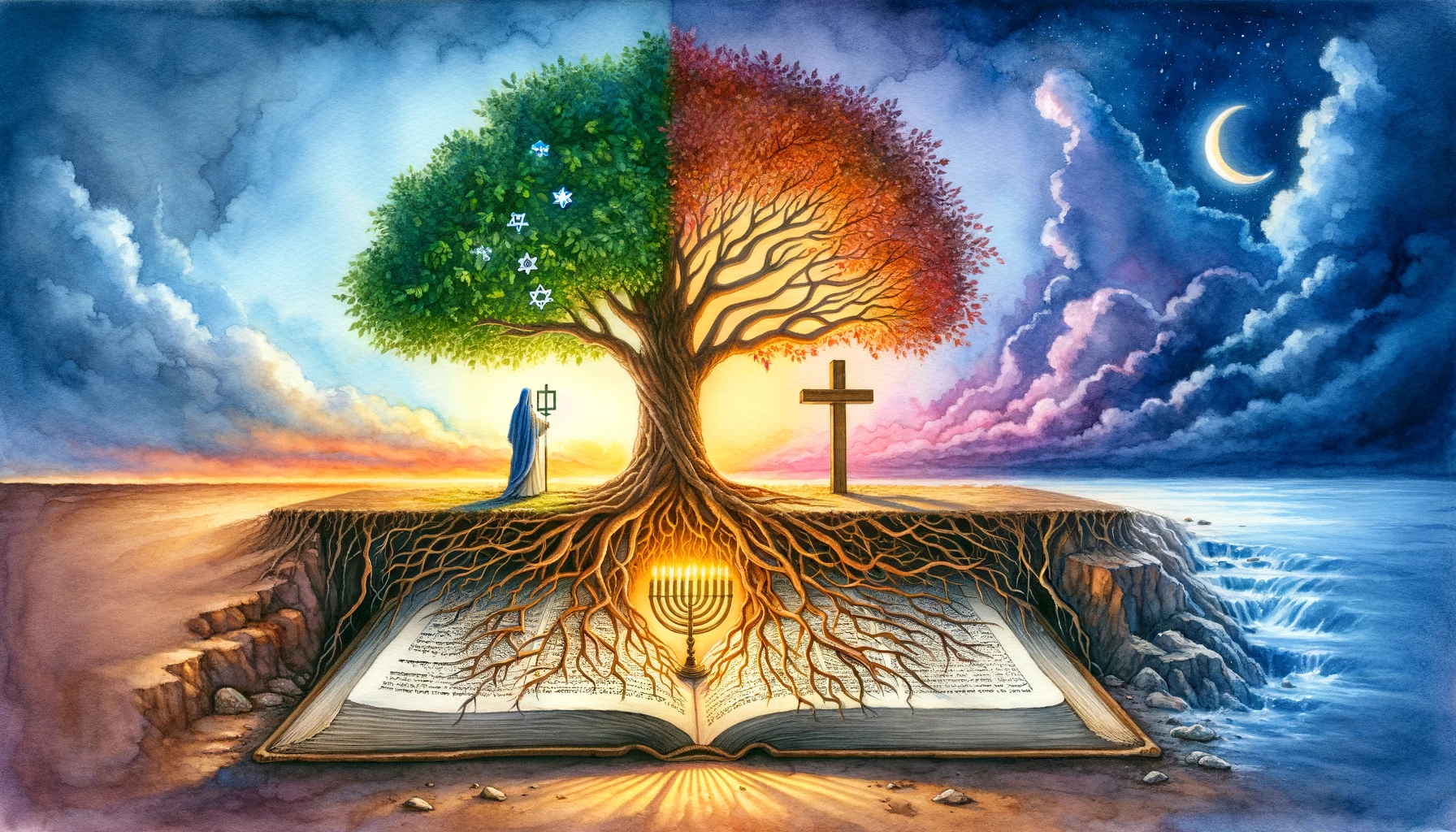In our interconnected and diverse world, the question of whether Jewish people and Christians worship the same God is more relevant than ever. This query not only touches upon theological similarities and differences but also invites us to consider how these two major world religions interpret their scriptures and understand the nature of God. What does the Bible say about God’s identity and character? How do the teachings of Jesus Christ align or diverge from Jewish understanding of God? And what implications does this have for interfaith dialogue and understanding? These questions frame our exploration, aiming to foster a deeper appreciation of both shared beliefs and distinct teachings.
Biblical Foundations: Understanding God in Judaism and Christianity
In the Christian faith, our understanding of God is deeply rooted in both the Old and New Testaments, reflecting a continuity that ties us to our Jewish roots. The God who created the universe, who made a covenant with Abraham, and who delivered Israel from Egypt is the same God we worship today. The Old Testament reveals God as the sovereign Creator, a just and merciful judge, and a loving father. Through stories of creation, covenant, and prophecy, we see a God who desires a relationship with His people, guiding and protecting them throughout history (Genesis 1, Exodus 20, Isaiah 53).
The New Testament continues this narrative, introducing Jesus Christ as the fulfillment of Old Testament prophecies and the ultimate revelation of God’s character and will. Through Jesus, God’s plan for salvation and His kingdom is revealed. The teachings and life of Jesus, as recorded in the Gospels, provide a clearer understanding of God’s nature as loving, forgiving, and holy. The concept of the Trinity, though not explicitly named in the Scriptures, emerges from the New Testament as a profound mystery of one God in three persons: Father, Son, and Holy Spirit (Matthew 28:19, John 14:9-11).
The relationship between God’s revelations in the Old and New Testaments is crucial for understanding the Christian faith. While the Old Testament focuses on God’s covenant with the Jewish people and His laws, the New Testament reveals the new covenant through Jesus Christ, accessible to all humanity. This does not mean the Old Testament is obsolete; rather, it sets the stage for the coming of Christ and the fulfillment of God’s promises (Matthew 5:17, Luke 24:27).
The concept of God in Christianity is thus both consistent with and a fulfillment of the Jewish understanding of God. The Christian belief in Jesus as the Messiah and Son of God represents the key difference in how God is understood in Judaism and Christianity. For Christians, Jesus is the lens through which we understand God’s nature and His intentions for humanity. The New Testament does not introduce a different God but reveals more fully the God of Abraham, Isaac, and Jacob, inviting us into a restored relationship through Jesus Christ (Hebrews 1:1-3).
The Holy Spirit plays a critical role in this relationship, as promised by Jesus and manifested at Pentecost. The Spirit guides, empowers, and comforts believers, living within us as a testament to God’s presence and active work in our lives today (Acts 2, John 14:26).
The Christian understanding of God builds upon the foundation laid in the Old Testament, presenting a continuous narrative that culminates in the revelation of Jesus Christ. Through the Scriptures, we see a God who is sovereign, just, and merciful, desiring a personal relationship with His creation. The New Testament reveals the fulfillment of God’s promises and the extension of His covenant through Jesus, accessible to all humanity. The concept of the Trinity encapsulates the mystery of one God in three persons, deepening our understanding of God’s nature and His interaction with the world. This foundation is essential for grasping the full scope of the Christian faith and our place within God’s ongoing story.
The Nature of God: Comparing Doctrinal Views
Christian doctrine elaborates on the nature of God with a depth and complexity that intertwines with the core of our faith. Central to this understanding is the concept of the Trinity, a foundational belief that distinguishes Christian understanding of God from Jewish theology. The Trinity describes God as one Being in three persons: Father, Son, and Holy Spirit. This concept, while not explicitly detailed in Scripture, is inferred from the relational and operational distinctions and unity between the Father, Jesus Christ, and the Holy Spirit throughout the New Testament (John 10:30, Matthew 28:19).
The Father is seen as the creator and sustainer of the universe, having an eternal, personal relationship with the Son and the Holy Spirit. The Son, Jesus Christ, is fully God and fully man, who came to earth to reveal God to humanity and provide salvation through His death and resurrection. The Holy Spirit is the presence of God in the world today, guiding, comforting, and empowering believers for godly living and service.
This triune nature of God emphasizes a relationship of love and unity within the Godhead, which reflects in the call for believers to live in love and unity with one another. The doctrine of the Trinity ensures a balanced understanding of God’s transcendence and immanence, His greatness above creation, and His presence within it.
In contrast, Jewish theology emphasizes the strict oneness of God, focusing on His singular essence and rejecting any division within His nature. The Shema, a central declaration of Jewish faith, asserts, “Hear, O Israel: The Lord our God, the Lord is one” (Deuteronomy 6:4), underscoring the unity and uniqueness of God in Jewish belief.
Christianity also differs in its view on Jesus Christ. For Christians, Jesus is the Messiah, the Son of God, who fulfills Old Testament prophecies and embodies the divine in human form. This belief is central to Christian faith and worship, distinguishing it from Jewish tradition, which awaits a future Messiah and does not recognize Jesus as divine.
The role of the Holy Spirit further differentiates Christian doctrine, emphasizing the Spirit’s active role in believers’ lives. The Spirit’s indwelling presence provides a personal connection to God, guiding in truth, sanctifying, and empowering for ministry, which aligns with New Testament teachings (Acts 1:8, John 16:13).
The Christian doctrine of God, articulated through the Trinity, presents a unique and profound understanding of God’s nature as one Being in three persons: Father, Son, and Holy Spirit. This doctrine highlights the relational aspect of God’s nature and His work in the world, distinguishing Christian faith from Jewish theology. The divinity of Jesus Christ and the active presence of the Holy Spirit are central to Christian belief, emphasizing salvation through Christ and the Spirit’s role in guiding and empowering believers. Understanding these doctrinal views is crucial for grasping the depth of Christian faith and its distinctions within the broader religious landscape.
Interfaith Dialogue: Implications for Christians and Jewish Relations
Interfaith dialogue between Christians and Jews holds profound significance, rooted in our shared biblical heritage yet acknowledging our distinct theological paths. This dialogue is not about diluting our faith but understanding and respecting our differences while recognizing our common ground. The Bible presents God’s interactions with humanity, first through the covenant with Abraham and later through the life, death, and resurrection of Jesus Christ, as central narratives for both faiths (Genesis 12:1-3, Matthew 28:18-20).
For Christians, Jesus Christ is the cornerstone of our faith, fulfilling the prophecies of the Old Testament and establishing a new covenant through His sacrifice. This belief in Jesus as Messiah and Son of God is a fundamental divergence from Jewish thought, which awaits a Messiah to come. However, both religions share a belief in the God of Abraham, Isaac, and Jacob, emphasizing themes of redemption, covenant, and moral and ethical living as outlined in the scriptures (Jeremiah 31:31-34, Hebrews 8:6-13).
Engaging in interfaith dialogue encourages Christians to deepen their understanding of their own faith, including the Jewish roots of Christianity. It also allows for greater appreciation of the Jewish perspective, including their interpretations of the scriptures and awaiting of the Messiah. This understanding fosters mutual respect and opens avenues for collaboration in areas of shared concern, such as social justice, peace, and ethical issues.
Furthermore, interfaith dialogue challenges Christians to consider how the New Testament teachings of love, forgiveness, and reconciliation can be lived out in relationships with people of other faiths. It invites us to reflect on how Jesus interacted with those of different beliefs and backgrounds, modeling a way of engagement that is respectful, compassionate, and rooted in love (Luke 10:25-37).
The implications of interfaith dialogue for Christian-Jewish relations are significant. It provides a framework for building bridges of understanding and cooperation, recognizing the richness of each tradition, and working together for the common good. While theological differences remain, these conversations can lead to a deeper respect for each other’s faith and a commitment to peace and justice in our communities and the world.
Engaging in interfaith dialogue between Christians and Jews enriches our understanding of both faiths, highlighting our shared biblical heritage and respecting our theological differences. It deepens Christians’ appreciation for the Jewish roots of their faith and fosters mutual respect. This dialogue opens opportunities for collaboration in promoting social justice, peace, and ethical living, reflecting the teachings of Jesus Christ on love, forgiveness, and reconciliation. Interfaith dialogue, thus, plays a crucial role in building bridges and enhancing relations between Christians and Jews, emphasizing the importance of understanding, respect, and cooperation in our diverse world.
Bridging Faiths with Understanding
At the heart of our faith is a God who desires relationship, revealed through the covenant with Abraham and fully in Jesus Christ. As Christians, recognizing our faith’s Jewish roots enriches our understanding and practice, highlighting the continuity and fulfillment found in Christ. This knowledge not only strengthens our faith but also equips us for respectful and meaningful engagement with our Jewish neighbors, promoting a deeper understanding across differences.
Key takeaways:
- The Christian understanding of God, while rooted in the Old Testament, is uniquely shaped by the life and teachings of Jesus Christ.
- The doctrine of the Trinity distinguishes Christian theology, emphasizing a complex yet unified nature of God.
- Interfaith dialogue between Christians and Jews fosters a deeper understanding and respect for our shared heritage and theological differences.
Further reflections:
- How can learning about the Jewish roots of Christianity enrich my faith journey?
- In what ways can I engage in respectful and meaningful dialogue with people of different faiths?
- What role does the doctrine of the Trinity play in my personal understanding of God?
Let this be a call to approach our faith with both a sense of humility and eagerness to learn. May our exploration of the depths of Christian doctrine and our shared biblical heritage with Judaism inspire us to live out our faith with conviction and compassion. In doing so, we not only honor our own beliefs but also show respect for those who tread a different path to the divine.














